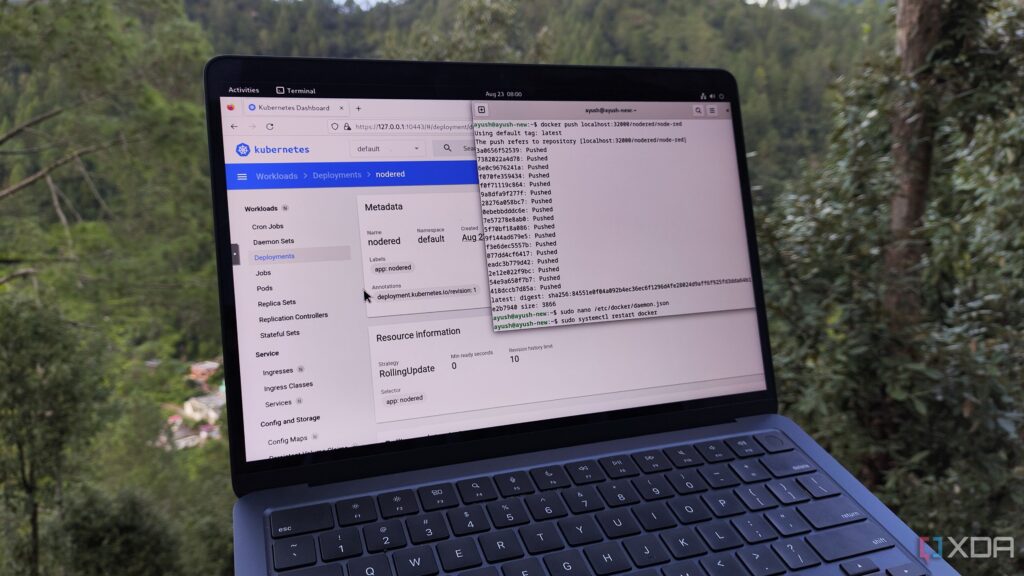
Kubernetes, the powerful container orchestration tool, is increasingly popular among tech enthusiasts and professionals looking to deploy, scale, and manage containerized applications. As more individuals turn to self-hosted workloads, several Linux distributions stand out as particularly effective for creating Kubernetes clusters. Here are five of the best options available today.
Raspberry Pi OS: The Compact Powerhouse
Raspberry Pi boards, often underestimated due to their small size, offer surprisingly robust capabilities for containerization projects. With the right setup, users can create a low-power Kubernetes cluster using just a few Raspberry Pi single-board computers (SBCs) and a router. The Raspberry Pi OS provides solid pre-installed packages and excellent performance. For optimal results, it is advisable to use the command-line interface (CLI) version, as a graphical interface can consume unnecessary CPU and memory resources. Users running MicroK8s on Raspberry Pi OS should consider adding the cgroup_memory=1 and cgroup_enable=memory flags to the /boot/firmware/cmdline.txt file to enhance performance.
Harvester and Rancher: A Virtualization Duo
While Harvester is primarily known as a virtualization platform, it integrates seamlessly with Rancher, an enterprise-grade tool for managing Kubernetes environments. This combination is particularly appealing for those looking to hone their container orchestration skills through experimentation. Although still experimental, the rancher-vcluster feature allows users to build a Kubernetes (or K3s) cluster and deploy the Rancher management interface within a virtual machine. Alternatively, users can deploy Rancher’s RKE2 distribution on virtual machines hosted via Harvester. However, potential users should be aware that Harvester’s demanding requirements may limit its feasibility for a reliable Kubernetes cluster.
Debian: The Reliable Choice
For those seeking a more traditional operating system, Debian is an excellent choice. Known for its stability and compatibility, it is an ideal OS for running Kubernetes workloads. Unlike more cutting-edge distributions, Debian’s straightforward nature provides a reliable environment for harnessing Kubernetes’ capabilities on a variety of devices, including non-Raspberry Pi SBCs.
Fedora CoreOS: Optimized for Containers
Following its acquisition by Red Hat, the original CoreOS was rebranded as Fedora CoreOS in 2020. This open-source distribution is specifically designed for container-heavy workloads and supports essential tools such as Podman, CRI-O, and Docker right out of the box. Users can easily adjust their system settings and install preferred packages using JSON code in the Butane configuration document. Additionally, Fedora CoreOS offers multiple recovery options, ensuring that users can maintain their Kubernetes stack even in the face of a system update failure.
Talos Linux: A Purpose-Built Solution
For those prioritizing security and performance, Talos Linux is a hardened distribution tailored for running Kubernetes clusters. By eliminating the traditional shell interface and SSH protocol in favor of an API-based setup, Talos enhances security through mutual TLS (mTLS) authentication and a read-only root filesystem. Users can configure Kubernetes on Talos using declarative YAML files, which simplifies the management of both control and worker nodes. With its small footprint, Talos allows Kubernetes to utilize the majority of system resources for container orchestration tasks.
While these five distributions are among the best for building Kubernetes clusters, others like DietPi and Alpine Linux are also noteworthy. DietPi, a minimal distribution, can effectively transform low-powered SBCs into reliable container hosts. Alpine Linux, known for its efficiency, may present some compatibility challenges due to its reliance on the musl library and openrc init system.
In conclusion, whether you are a home lab enthusiast or a professional looking to refine your DevOps skills, these Linux distributions provide a range of options for effectively deploying and managing Kubernetes clusters. Each has its strengths, making it essential to choose the one that best fits your specific needs and resources.






